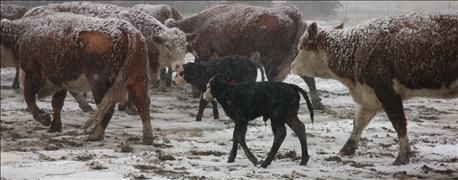March 6, 2016

There’s a couple reasons to keep a close eye on calves during cold, wet weather that often occurs in the spring.
“The stress of cold, wet weather and fighting muddy conditions seems to weaken the immune system to the point whereby bacteria, viruses and certain protozoa such as coccidia gain a foothold and can cause clinical disease,” says Extension veterinarian and livestock stewardship specialist Gerald Stokka. “Very young calves may develop diarrhea symptoms, while older calves may show signs and symptoms of respiratory disease.”

The weather is tough for this young calf.
Weather events also simply can interrupt the nursing frequency enough that calves can develop “milk scours,” says Carl Dahlen, Extension beef cattle specialist. Look for calves that are not full and don’t appear to be nursing, or dams with full udders and no signs of clean teats as evidence of nursing. Calves may have very loose stools, which can be white or yellow and very runny.
“The calves may not need treatment, but if diarrhea is evident, along with signs of dehydration (sunken eyes), lethargy and depression, some therapeutic intervention is necessary,” Stokka says. “Consult with your veterinarian about specifics regarding fluid therapy, and any use of antibiotics if systemic infection is suspected.”
Calves from 3 to 6 weeks old may develop painful and distended abdomens. These calves will need immediate treatment that may include certain antitoxins. Older calves that show symptoms of respiratory disease such as depression, drooping ears, lack of fullness in the abdomen and perhaps an increased respiratory rate need to be examined. A resting rate of 15 to 40 breaths per minute is considered normal, depending age and activity.
Any of these signs or symptoms may require some type of intervention and therapy, so producers should consult with their veterinarian for the appropriate therapeutic regimen.
Source: SDSU Extension
You May Also Like




